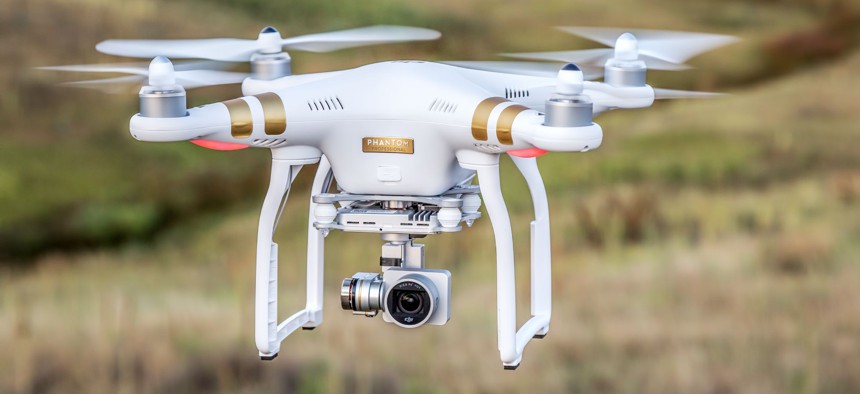Drone Aspirations in Virginia Coal Country Get a Federal Boost

Shutterstock
$2.2 million will support new training programs focused on unmanned aerial vehicle technology in a county in the southwest part of the state.
Attempts to turn a county in a southwestern Virginia coalfield region into a hub for the drone industry got a boost last week from a $2.2 million federal grant.
The money will go toward expanding the existing unmanned aerial vehicle course curriculum at Mountain Empire Community College, located in Big Stone Gap, a town in Wise County. Courses will be geared toward teaching students to use drone technology for commercial and government services, such as surveying, infrastructure inspections and mapping.
With about 40,000 residents, Wise County is located in Appalachia, on Virginia’s border with Kentucky. Declines in the coal industry have dealt a blow to the local economy in recent years. Against this backdrop, efforts have unfolded to attract drone-related enterprises to the county, as Route Fifty reported in July.
Those seeking to develop the aerial drone industry in Wise County say the sparsely populated and rugged terrain there make it well suited for testing unmanned aircraft. They also point to the skilled labor pool available from the region’s coal mining sector.
For about four years, Jack Kennedy, the clerk of the Wise County and City of Norton Circuit Court, has been championing the idea that the county can become an epicenter for drone-related ventures.
“We see this as a significant, incremental step forward,” he said by phone Friday, referring to the grant.
“We hope to expand it into a multi-state effort, working with community colleges in Kentucky and West Virginia,” he added. “And also to bring in more and more companies.”
The grant was announced Wednesday.
It was awarded by the Appalachian Regional Commission to the Wise County Industrial Development Authority, under an Obama Administration program designed to spur commercial activity in places with economies that traditionally depended on the coal industry.
The grant program is called the Partnerships for Opportunity and Workforce and Economic Revitalization, or POWER. A total of 42 grants, worth nearly $28 million, were awarded through the program last week. The money will support projects in 13 states.
Working with Mountain Empire Community College to expand its aerial drone curriculum will be two private firms: Drone Airspace Management, or DAM, and Aurora Flight Sciences Corp.
Aurora develops unmanned aerial systems and aerospace vehicles.
In August, the company announced plans for testing its optionally piloted Centaur airplane out of Lonesome Pine Airport in Wise County. A modified Diamond Aircraft DA-42, the Centaur is about the size of Cessna. In “unmanned mode,” it can spend 14 to 20 hours in flight, according to Aurora.
Some of the new courses at Mountain Empire will focus on larger-sized drones, like the Centaur.
When equipped with sensors and high resolution cameras, these aircraft could be used to inspect roads, survey coastline, or monitor conditions after a natural disaster.
DAM works with companies breaking into, or expanding within, the unmanned aerial vehicle industry.
Avery Brown, who leads strategic marketing and business development for the company, said by phone Friday that DAM would help Mountain Empire to develop an aerial drone curriculum that aligns with commercial needs. He said DAM has had discussions with companies in variety of fields where drones are expected to be used in coming years.
Cell phone signal tower inspections were one example he mentioned.
As described by Brown, the expanded curriculum at Mountain Empire will be designed not only to train students to pilot unmanned aircraft, but also to teach them about drone sensor technology, and the data the aircraft can be used to collect.
Brown noted the importance of students acquiring some knowledge about industries in which drones might be deployed. For instance, becoming familiar with the components of a cell phone tower, so they can communicate clearly with clients and employers when planning and carrying out inspection flights.
“Just because you know how to fly doesn’t mean you know how to do something on a professional or commercial level," Brown said.
Some of the proposed classes will be targeted toward college students, and others toward corporate professionals.
The collaboration between Mountain Empire, DAM and Aurora is part of a program that's been dubbed the Virginia Emerging Drone Industry Cluster. In conjunction with the grant award, Aurora announced last week it would commit $880,000 to support the program.
Previous course offerings at Mountain Empire have covered topics like basic flight principles, drone safety, building quad-copters, and preparing students to get certified as pilots of the aircraft. Federal Aviation Administration rules that went into effect earlier this year include requirements for people who fly drones for work or business.
Looking beyond the grant, Kennedy highlighted plans to test PocketQubes—satellites known for their 5 centimeter, cube-shaped size—on unmanned aircraft in southwest Virginia, before launching the devices into orbit from NASA’s Wallops Flight Facility on the state’s eastern shore.
He said that initiative reflects a “determined effort” to generate interest among K-12 and college students in and around Wise County in drones, aviation, aerospace and space science.
“Workforce development and inspiration,” he wrote in an email, “is critical to the transitioning Central Appalachian economy.”
Bill Lucia is a Reporter for Government Executive’s Route Fifty and is based in Washington, D.C.
NEXT STORY: Days of Low-Cost Gas Are Over in N.J.; Flint’s ‘Chilling Effect’ on Mich. State Workers






